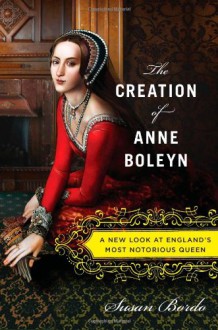
This is a hard book to rate for me. I feel like it vacilitated between a four and a two, which is why I left it at three, but I'm not completely comfortable with that rating. I guess a lot of my trouble was that I couldn't quite pin down what it was supposed to be. It was part biography, part social commentary, and part really personal, and all kind of thrown together.
I use the term "biography" in this instance rather loosely. If I hadn't had background on Anne I fell like I would have been in a bit of trouble trying to follow some of this. It bounces around a little bit too much for my taste and I feel like there is a lot of repetition and even re-quoting of the same passages from the same sources. It is heavily focused, perhaps rightly, on the trial and then backtracks to attempt to handle the charges against Anne.
Valid points against the neutrality of previous writers on the subject are brought up again and again, and then promptly ignored for this book's own narrative purposes, which makes it really obvious. Mary is a "spoiled brat", Henry is a sociopath, people's motives on writing badly about Anne are boiled down to an overly-simplistic view and those who write for her are ignored. Now, I don't really mind some creativity in terms of narrative or interpretation of events and people in my history. I know everyone does it, and that is why I read more than just one (or even two or three) non-fiction books on a given subject--in the hopes of being able to grasp the full narrative. My issue with it here is exclusively the unawareness of the language coupled with the awareness of everyone else doing it. It feels awkward to go from complaints about a lack of neutrality in the language directly into doing it.
The cultural history of Anne mostly consists of a discussion of her portrayals in popular culture and the responses to them. It was pretty heavily unbalanced in favor of picking apart the negative portrayals. Positive ones were brought up and then shortly dismissed unless words from one of those authors was needed to convict another, which was a shame, because I wanted to hear more about what they were doing right. Pages and pages and pages are devoted to complaints about historical inaccuracy in anything that is not kind in their portrayal of Anne, and occasionally in personal-sounding attacks against the authors.
The section on the fansites was probably my favorite. I found all of the interaction going on there to be fascinating and it was nice to hear thoughts about Anne from the kind of people who might also be reading this book, although they were clearly cherry-picked. I like the idea of an internet group that internally policed scholarship on the Tudors and required vigorous proofs for any statements made.
This was supposed to be a book to ease me into some more positive portrayals of Anne. I was aware that most historical fiction on her was pretty negative, and I had hoped this book would clear up why and steer me towards some interesting positive portrayals. Unfortunately, what it left me with was an awkward feeling towards her defenders. It was overzealous in her defense, and not quietly so. It was too focused on other authors. It left me with disbelief and a faint disquiet. Now I don't believe anyone. On the other hand, I am intrigued enough to pick up another book on Anne, and to reconsider what others have been saying about her, so in that regard the book succeeded at its purpose.
 The topic of body image and its associated behaviors are efficiently preluded on the first page of Susan Bordo’s book through Delmore Schwartz’s poem The Heavy Bear. It introduces the dualism of the body; how it is both our being as well as an inescapable pest. It expounds on the idea that the body is a “brute” equipped with a primitive need to consume in order to feel fulfillment. Essentially, the body is heavy baggage for many people, constantly pulling downwards towards what it “needs”, but not necessarily towards what the mind wants. The rest of the book really revolved around that and I enjoyed it.
The topic of body image and its associated behaviors are efficiently preluded on the first page of Susan Bordo’s book through Delmore Schwartz’s poem The Heavy Bear. It introduces the dualism of the body; how it is both our being as well as an inescapable pest. It expounds on the idea that the body is a “brute” equipped with a primitive need to consume in order to feel fulfillment. Essentially, the body is heavy baggage for many people, constantly pulling downwards towards what it “needs”, but not necessarily towards what the mind wants. The rest of the book really revolved around that and I enjoyed it.

 Log in with Facebook
Log in with Facebook 






